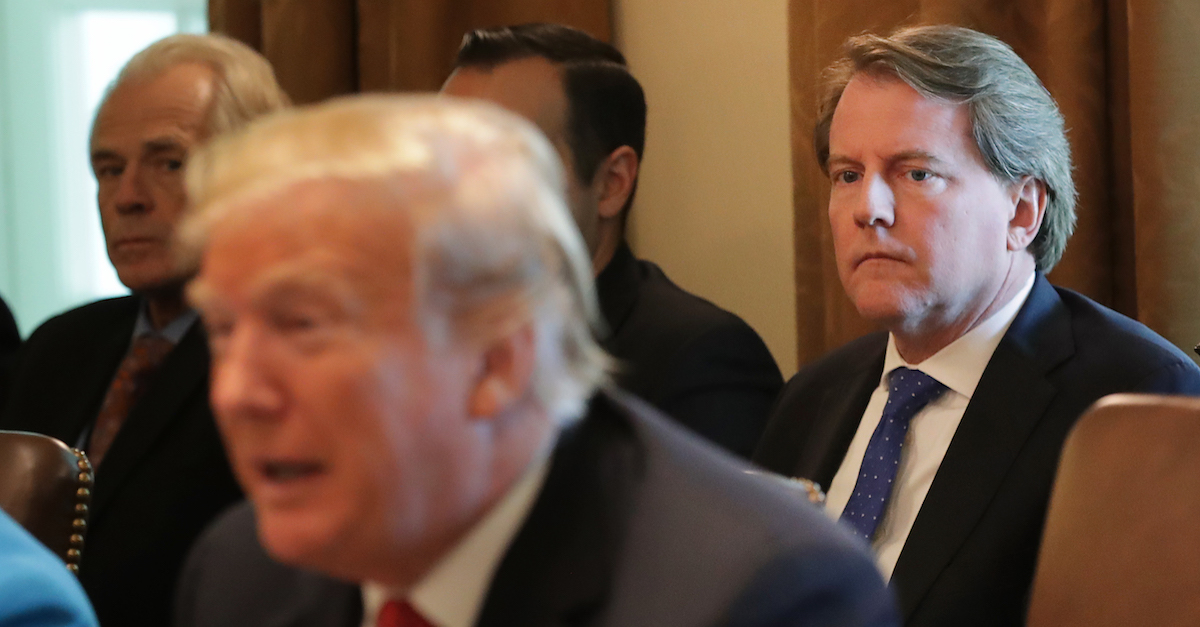
The Department of Justice (DOJ) blew up congressional Republicans’ excuse for refusing to call John Bolton and Mick Mulvaney as witnesses at the impeachment trial in the Senate. The criticism goes: if Democrats were serious about securing this first-hand knowledge of events relevant to their case against President Donald Trump, they would have done the appropriate thing and attempted to enforce subpoenas in the courts. Enter the DOJ stonewall.
In a 41-page filing with the U.S. Court of Appeals for the District of Columbia on Thursday, Assistant Attorney General Joseph H. Hunt and other DOJ lawyers rubbished the notion that the U.S. House of Representatives has any right whatsoever to the testimony of former White House counsel Don McGahn.
Attorneys for congressional Democrats on the Judiciary Committee recently filed a brief arguing for exactly that–seeking to enforce a lower court order that McGahn must comply with long-ago-issued subpoenas sent under the auspices of the House’s still-ongoing impeachment probes.
“The [Judiciary] Committee’s brief illustrates the fundamental separation-of-powers problems presented here,” the DOJ argued. “In defending this virtually unprecedented suit to compel the congressional testimony of a former close presidential advisor, the Committee at every turn disregards the Constitution’s text, history and tradition, Supreme Court precedent, and Congress’s own legislative judgments.”
The DOJ’s filing continues:
[T]he Committee ignores the basic principle that it must have constitutional authority to act; it instead assumes without explanation that the House’s implied and incidental power to compel testimony may be significantly extended to reach the President and his close advisors despite the substantial burdens that would impose on presidential autonomy and confidentiality.
“[C]ompelled testimony of close presidential advisors would be a direct regulation of conduct for which the Committee must possess affirmative constitutional authority,” the filing concludes. “None exists, and thus the subpoena of McGahn is invalid.”
So, the Trump administration’s legal position is crystalline: McGahn doesn’t have to observe extant congressional subpoenas.
But that’s precisely the opposite of what congressional Republicans have advised as recently as just this month.
“There’s a number of ways to enforce your requests,” said House Republican impeachment counsel Steve Castor in early December, “The fundamental rule of any congressional investigation is: you rarely get what you’re asking for unless the alternative is less palatable for the respondent.”
Castor then elaborated as to the sort of congressional hardball he envisioned:
You can saber-rattle–it’s legal to saber-rattle–about holding somebody in contempt. Oftentimes, witnesses who are reluctant to cooperate and come forward–when you attach a contempt proceeding or a prospective contempt proceeding to their name–a lot of times that changes the outcome. With a contempt proceeding you’ve got a couple different steps along the way. You could raise the prospect of a contempt proceeding. You could schedule a contempt proceeding. After you schedule a contempt proceeding, you could hold the door open for documents or interviews and then you could push it off. You could go through at the committee level. And these are all sort of milestone events which historically are unpalatable or less palatable for the administration that sometime start to move the needle.
Castor’s somewhat chastising point was essentially that Democrats just hadn’t tried hard enough to enforce their duly-issued subpoenas–a stark contrast from the DOJ’s argument that those same subpoenas are wholly unenforceable.
Senate Majority Leader Mitch McConnell (R-Ky.) repeated essentially the same argument as Castor on Tuesday.
“It is not the Senate’s job to leap into the breach and search desperately for ways to ‘get to guilty.’ The Senate is meant to act as judge and jury — to hear a trial. Not to re-run the entire fact-finding investigation, because angry partisans rushed sloppily through it,” he said, criticizing Democrats for not enforcing subpoenas.
NPR asked Bolton on Thursday for comment on the impeachment inquiry. He said that he has “a lot to say on the subject” but wasn’t going to get into it because — wait for it — he has no idea if he should obey the White House directive not to testify.
“Well, you know, there’s obviously a lot swirling around in that department, including some litigation that could affect my status. So I think although I have a lot to say on the subject, the prudent course for me is just to decline to comment at this point,” Bolton said, before mentioning Dr. Charles Kupperman. “Dr. Kupperman, my former deputy, is in litigation now on what to me is a critical separation of powers question. When the House issues a subpoena – and in his case, and I think it would be true in mine – and the President tells him not to testify, which authority controls? Dr. Kupperman went to court to seek the third branch’s opinion in this conflict between the first two. I think that’s a very important issue that needs to be resolved.”
A federal court recently issued a strongly-worded opinion lambasting the DOJ’s anti-subpoena stance.
“[I]t is a core tenet of this Nation’s founding that the powers of a monarch must be split between the branches of the government to prevent tyranny,” observed U.S. District Judge Ketanji Brown Jackson in a blistering 120-page opinion. “Thus, when presented with a case or controversy, it is the Judiciary’s duty under the Constitution to interpret the law and to declare government overreaches unlawful.”
“Similarly, the House of Representatives has the constitutionally vested responsibility to conduct investigations of suspected abuses of power within the government, and to act to curb those improprieties, if required. Accordingly, DOJ’s conceptual claim to unreviewable absolute testimonial immunity on separation-of-powers grounds–essentially, that the Constitution’s scheme countenances unassailable Executive branch authority–is baseless, and as such, cannot be sustained.”
Read the full DOJ filing below:
DOJ: lawsuit over McGahn su… by Law&Crime on Scribd
[Image via Chip Somodevilla/Getty Images]